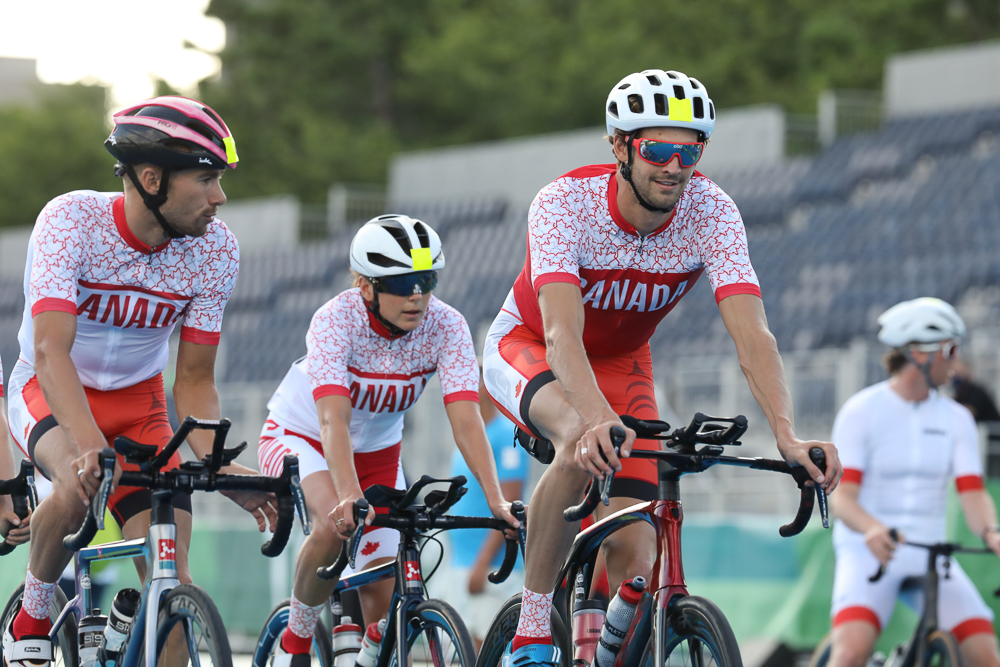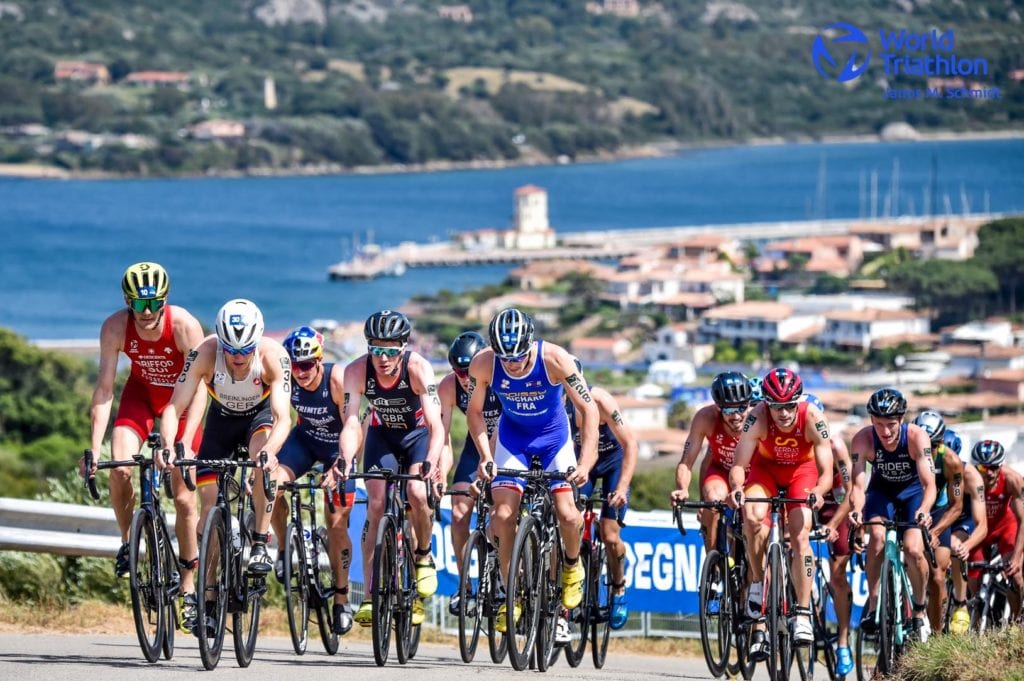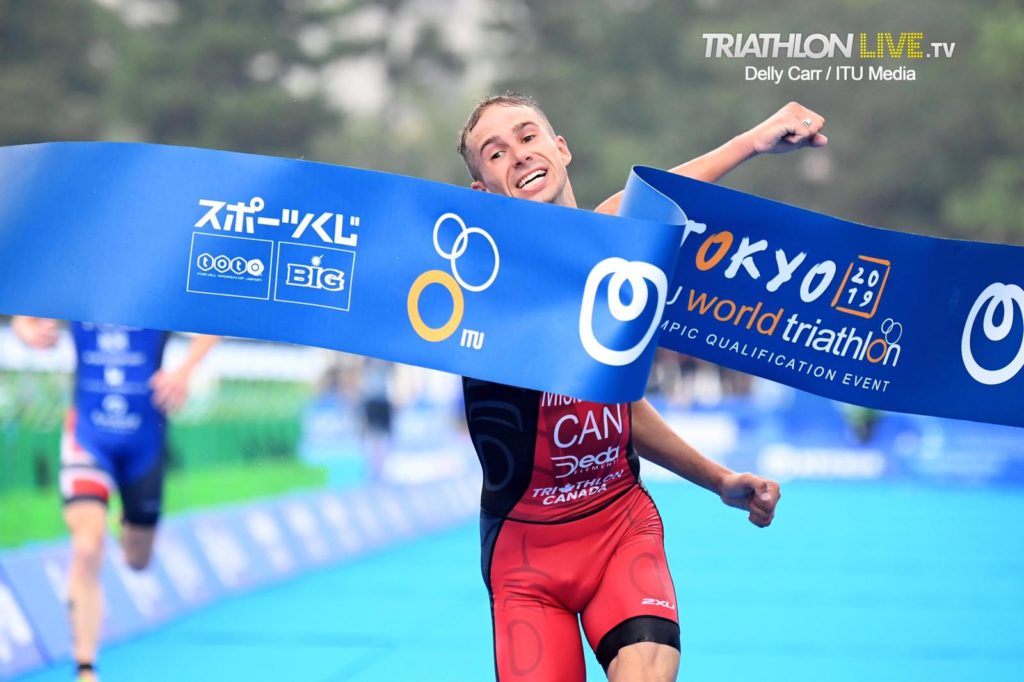Olympic triathlon men’s preview: can Mislawchuk and Sharpe work their magic again?
The Olympic men's triathlon takes place at 6:30 AM Monday, July 26 local time (Sunday, July 25 17:30 EST)
 Photo by:
Frank Wechsel
Photo by:
Frank Wechsel
There’s pretty much only one guarantee when it comes to putting together a preview for the first of three triathlon events at the Tokyo Olympic Games – this is not going to be a boring event where a pre-race favorite blows away the rest of the competition. In fact, coming up with even one or two pre-race favorites seems impossible heading to Tokyo. The other huge factor that makes it hard to make a call is the heat – conditions are expected to be stifling in terms of temperature and humidity.
The race takes place at Odaiba Park, a small island in Tokyo Bay between Koto City and Shinagawa City. The individual races being with a 1.5 km swim that starts on a pontoon and heads towards Bird Island. There’s a 950 m first loop followed by a 550 m second loop. The athletes then hit the bike for a technical, eight-loop, 40 km bike course that features a few 180 degree turns. The race finishes with a 10 km, four-loop run course around the park before the athletes hit the finish line next to Tokyo Bay.
Related: How to watch the Olympics
Even the water is hot in Tokyo – the water temperature for the two-loop swim is expected to be 30 degrees C.

Breakaway, or big group?
Traditionally, in the men’s triathlon at the Olympics, not too far into the bike ride you see things split into three groups – 40 percent of the field are in the first bunch, 40 percent make up the chase group, then about 20 percent of the field find themselves in the “stragglers” category. That formula seems especially likely this year as the list of strong swimmers who can come out of the water near the front is large. One would imagine that South Africa’s Henri Schoeman is most likely to do the honors of leading into T1, but that’s hardly a certainty. He will likely have some company, too, possibly in the form of France’s Vincent Luis, who arrives in Tokyo as a two-time defending world champ and, in all likelihood, the man everyone else in the field is going to be trying to make uncomfortable in this race.
Of all the men competing at the Olympics, Luis appears to be the man most capable of winning in a variety of different ways. He’s very strong in the water, has really worked on his bike strength of late, and can be devastating on the run – how’s that for a triple threat? So Luis would be happy to join Schoeman and a few others in a breakaway on the bike, but he’ll likely also be quite happy to be part of a bigger group, knowing that he’s capable of outrunning just about anyone if the day comes down to a footrace.
If there is a smaller breakaway group, one athlete likely to be in that mix is Germany’s Jonas Schomberg, who has blasted out to the front it seems in every race he’s competed in this year, seemingly trying to come up with the winning formula for a race like the Olympics. Could he take a flyer and make it work on Monday morning in Tokyo? Jonathan Brownlee would dearly love to see a smaller group break clear – it’s a format that he and brother Alistair have successfully used for years, but without Alistair in the lead group to keep everyone in line, it’s even less likely that a smaller group will remain away for the entirity of the bike.
There’s another reason to believe that a breakaway group will struggle to remain clear: the Norwegian train. With Kristian Blummenfelt, Gustav Iden and Casper Stornes in the race, all of whom are likely to come out of the water 30 seconds or more behind the leaders, there will be some power at the front of the chase pack ready to tow the group back to the front.

10 km foot race
Canada’s hopes for another Olympic medal to go along with Simon Whitfield’s gold in Sydney (2000) and silver in Beijing (2008) rest on the shoulders of Tyler Mislawchuk. The selection for the second Canadian man to head to Tokyo was dependent, to a large extent, on that athlete’s ability to serve as a domestique for Mislawchuk. Matthew Sharpe has proven to be an able “domestique” for Mislawchuk, getting him into a perfect position at the end of the ride to ensure he’s either in the lead or near it coming out of T2. That approach worked perfectly at the Tokyo Test Event in 2019, and most recently at the World Triathlon Cup Huatulco last month. Just a week ago the plan worked again as Mislawchuk took the America’s Triathlon Cup Long Beach.
The support from Sharpe could prove pivotal on Monday morning as there are a number of athletes who appear ready to pull out all the stops on the run, too, if it comes down to a 10 km road race to decide the medals. We’ve mentioned a few of those athletes already – Luis, of course, has proven he can take the win on the run in a variety of ways, sprinting to the win or driving from a ways out. It’s hard to completely rule out Jonathan Brownlee, too, but you really have the feeling that his best chance for the win would come as part of a breakaway. Another awesome runner, Jelle Geens, has tested positive for COVID-19, so he won’t be in the field for the individual race. As we mentioned earlier, Shomberg has been pushing hard early on the run in all of his races this year, so he could be in the medal-mix, too.
Then there’s that Norwegian train. Blummenfelt won WTCS Yokohama and then took the World Cup win a week later in Lisbon, all thanks to a punishing bike pace followed by an equally strong run. If the three Norwegians can keep the pace high on the bike and take away the legs of some of the speedsters, Blummenfelt would be in a great position to take another win.
So who are those speedsters? There are a lot of them. Of course Canadians hope that Mislawchuk can work his magic in Tokyo again, but he’ll have some fast company, for sure. New Zealand’s Hayden Wilde shared the podium with Mislawchuk in Tokyo in 2019 – he’s a lighter athlete who does well in the heat, too. A fifth-place finish in Leeds last month proved he’s on the right track towards a big day. Great Britain’s Alex Yee is coming off an impressive win at WTCS Leeds, where he ran his way to the win. American Morgan Pearson has been on a steady upwards track over the last few races thanks to his impressive running talent, too – he was third in Yokohama and second in Leeds. Then there are some of the more experienced athletes in the field who have used their prodigious running talents to earn numerous wins and world titles – Spain’s Mario Mola and Javier Gomez would be the best examples on that front. If things come down to a sprint and Australia’s Jacob Birtwhistle is in the mix, he’ll be one to watch. The Aussie has shown some incredible run speed over the years and if he has the chance to unleash that final kick and is in the medal mix, he could take gold, too.
Yeah, we know – that’s a long list of medal contenders. And there’s a good chance someone we haven’t mentioned here could have the day of their lives and finish on the podium. The only thing that we can be sure of when it comes to the men’s race is that it’s going to be exciting.
